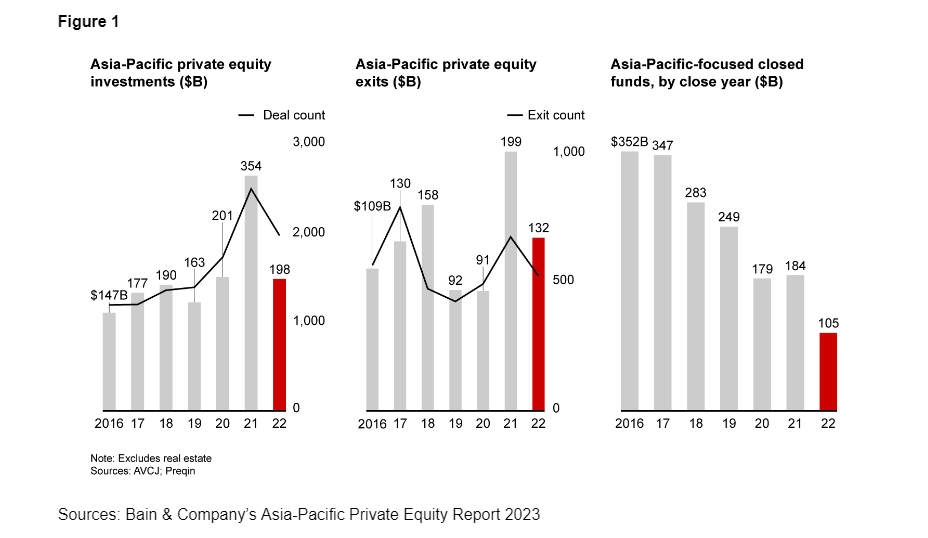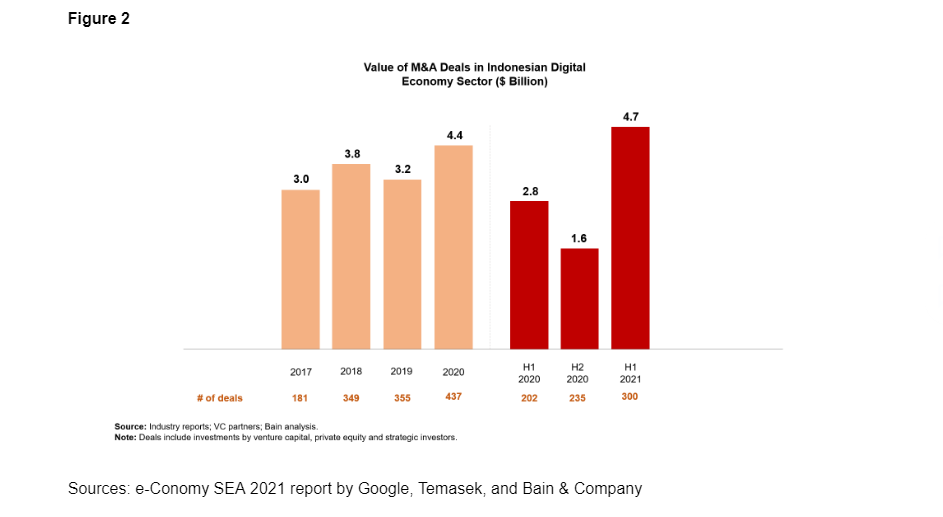In 2022, private equity funds in the Asia-Pacific region faced challenges as they shifted towards a more cautious approach, ending a period of strong dealmaking. The economic slowdown, along with global and regional uncertainties, led to a significant decrease in deal value by 44% to $198 billion compared to the previous year. General partners scaled back their activities, impacting exits and fundraising.
The surge in deal value in 2021, driven by investor enthusiasm and ample global capital, was followed by a sharp decline in 2022. Economic factors played a role, causing deal values to return to 2020 levels. Slower economic growth, declining consumer confidence, reduced manufacturing output, inflation, and geopolitical tensions contributed to investor pessimism. Even the relaxation of Covid restrictions did not reverse the downward trend. Macroeconomic weakness emerged as the top concern for investors in the region, according to Bain’s 2023 Asia-Pacific Private Equity survey.

Private Equity and Venture Capital Potential in Indonesia
Indonesia with its vast population, growing middle class, and dynamic entrepreneurial ecosystem, holds immense potential for private equity (PE) and venture capital (VC) investors. As Southeast Asia’s largest economy, the country offers a diverse range of investment opportunities across various sectors.
Indonesia’s robust economic growth, stable political environment, and favorable demographics make it an attractive destination for investors. With a population of 280 million, and increasing consumer spending power, the country presents a vast domestic market ripe for investment.
According to the Statistics Indonesia (BPS), Indonesia’s GDP grew by 5.31% in 2022 showcasing its resilience amid global uncertainties. This economic growth, coupled with a rapidly evolving business landscape, provides a fertile ground for PE and VC investments.
With this rapid development, PE and VC investors are increasingly recognizing Indonesia’s potential and have been actively participating in the market. Notable global and regional firms have established dedicated funds or partnered with local entities to capitalize on the country’s opportunities.
According to a report by Statista, PE and VC deals in Indonesia reached a value of approximately $6.4 billion in 2021. Furthermore, the number of VC deals in the country has been steadily increasing, reflecting the growing investor interest in early-stage startups.
Indonesia’s startup ecosystem has experienced significant growth, particularly in the technology and digital sectors. Jakarta, the capital city, has been dubbed the “Unicorn Factory” due to the emergence of multiple startups valued at over $1 billion. E-commerce, fintech, logistics, and healthtech are among the thriving sectors attracting substantial investments.
According to a report by Google, Temasek, and Bain & Company, Indonesia’s internet economy is expected to reach $124 billion by 2025. This growth presents substantial opportunities for PE and VC investors to support and capitalize on the innovation-driven startup ecosystem.
While technology and digital startups have dominated the investment landscape, opportunities for PE and VC extend beyond these sectors. Traditional industries such as manufacturing, consumer goods, healthcare, and infrastructure present untapped potential for investors. According to Indonesia Investments, $287 million was invested in real estate, specifically in residential, commercial, and office spaces. The food business came in second place, closely followed by the chemical and pharmaceutical industry, with $254 million and $165 million respectively, being invested. Investments in agriculture, plantations, and cattle likewise exceeded the $134 million threshold, as did those in transportation, warehousing, and telecommunications. The inclusion of the machine and basic metal industries on the list demonstrates the wide range of opportunities that Indonesia provides to companies and investors from different industries.
The Indonesian government has taken proactive measures to stimulate investment activity and foster entrepreneurship. Initiatives such as the “Making Indonesia 4.0” roadmap, which focuses on promoting digital transformation and industry innovation, have created an enabling environment for startups and technology-driven companies. The government’s infrastructure development plans, including the “National Strategic Projects” also offer attractive investment prospects in areas such as transportation, energy, and telecommunications.
Additionally, the government has introduced regulatory reforms to attract more foreign investments and streamline business processes. The Omnibus Law on Job Creation aims to simplify regulations, improve the ease of doing business, and enhance investor confidence.
Indonesia’s Thriving Investment Ecosystem
Mergers and acquisitions (M&A) have been gaining momentum in Indonesia, offering opportunities for PE firms to invest in established companies. The country’s dynamic business landscape, coupled with the need for consolidation and expansion, presents attractive prospects for strategic investments and value creation.
PwC Indonesia stated M&A’s substantial growth in Indonesia was primarily driven by four key sectors; the telecommunications and technology sectors ($14.7 billion), the business services sector ($2.7 billion), the transportation sector ($2.2 billion) and the energy, mining, and utilities sector ($2.0 billion). This impressive expansion has been made possible due to the proactive efforts of the Indonesian government, which has implemented regulatory reforms and focused on infrastructure development to stimulate and bolster these sectors.
Additionally, the e-Conomy SEA 2021 reported digital economy in Indonesia is experiencing a significant boom as the country became the most popular investment destination in Southeast Asia in the first half of 2021. The market has solid growth fundamentals, which are demonstrated by the recent increase in market consumers. Since the Covid-19 pandemic began, as many as 21 million new users have entered Indonesia’s digital market.

The maturing of the Indonesian PE and VC market has witnessed a rise in successful exits, providing liquidity and demonstrating the viability of investments. Initial public offerings (IPOs), secondary sales, and trade sales are among the exit routes available to investors, contributing to the attractiveness of the Indonesian market.
While the potential for PE and VC in Indonesia is evident, challenges remain. These include regulatory complexities, legal frameworks, talent availability, and the need for continued improvements in ease of doing business. Investors must navigate these challenges while capitalizing on the opportunities presented by the country’s vibrant investment landscape.
According to Daily Social’s Startup Report 2022, a total of $4.2 billion from 260 funding transactions will flow to the Indonesian startup industry throughout 2022. This amount is down from the previous year’s $6.9 billion, even though the number of transactions was only 214. Geopolitical circumstances might have influenced investments in this area, potentially leading to this outcome. Unprecedented economic conditions have created challenges for entrepreneurs looking to secure funding for their ventures, in contrast to the remarkable surge in total funding amounting to $25.8 billion witnessed in 2021.
However, the e-Conomy SEA report from Google, Bain & Company, and Temasek in 2022 actually demonstrates a favorable trend, with predictions that Indonesia’s digital economy will reach $130 billion in 2025 and up to $360 billion in 2030. There are three particular industries that are projected to lead the investment growth, which are green technology, health technology, and integrated finance. The increasing demand for sustainable solutions also opens avenues for impact investing in renewable energy, agriculture, and environmental conservation.
In conclusion, Indonesia’s private equity and venture capital market hold immense potential for investors. The country’s strong economic growth, thriving startup ecosystem, government support, growing investor interest, and favourable demographic trends create a conducive environment for PE and VC investments.
By leveraging these opportunities, investors can contribute to the development of innovative businesses, job creation, and sustainable economic growth in Indonesia. However, it is crucial for investors to conduct thorough due diligence, stay informed about the evolving regulatory environment, and forge strategic partnerships to maximize their chances of success in this dynamic market.














